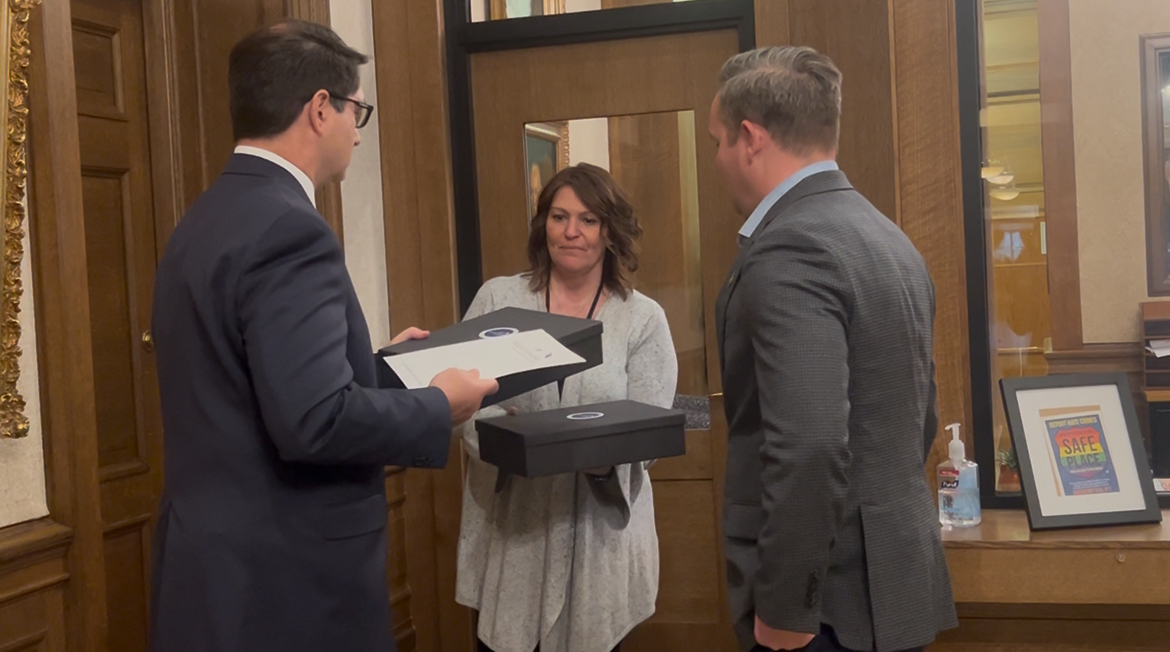Related Articles
Relevant Topics
-
Evergreen Freedom Foundation
-
First Amendment to the United States Constitution
-
Harris v. Quinn
-
Illinois
-
Indiana
-
labor union
-
Medicaid
-
SEIU Local 775
-
Service Employees International Union
-
Supreme Court of the United States
-
The Seattle Times
-
United States Constitution
-
Washington
-
Washington Department of Social and Health Services
Last week I highlighted a letter from Sen. Braun to the Attorney General requesting an informal opinion in response to the June 30 U.S. Supreme Court ruling Harris v. Quinn, which called into question the forced unionization of some Washington residents. The Senator asked these three questions:
- “Does the U.S. Supreme Court’s ruling in Harris v. Quinn prevent the state from maintaining a union security provision in its collective bargaining agreement with any union representing individual providers?
- In light of the U.S. Supreme Court’s decision in Harris v. Quinn, what must an individual provider do in order to be viewed by the state as a nonmember of Service Employees International Union Healthcare 775NW for the purposes of RCW 41.56.113?
- What liability attaches to the state if state agencies deduct union dues or other fees from non-member individual providers without their express, written permission?”
Citing a current lawsuit in federal district court against the state and attorney-client privilege, the Attorney General has declined to provide the requested opinion or public comment on what he believes the impact of Harris v. Quinn to be in Washington.
The lawsuit in question is Centeno v. Dept. of Social & Health Services. On July 11, the plaintiffs in that case filed an amended complaint citing the recent Harris v. Quinn decision to make their case:
The State contends that it may lawfully compel Individual Providers to support SEIU, under an exception to the First Amendment rule that allows states to compel their employees to pay dues to labor unions. However, the State may not invoke that exception here because, by its own admission, Individual Providers are not full-fledged employees of the State, but instead are merely deemed, by legislative fiat, to be State 'employees' for the sole and limited purpose of collective bargaining. The rationale that permits states to compel their employees to pay union dues does not apply in the context of the relationship between Individual Providers and DSHS. Indeed, the United States Supreme Court confirmed this in its recent opinion in Harris v. Quinn (striking down similar Illinois scheme forcing personal care providers to join and pay dues to SEIU-Illinois & Indiana).
Interestingly, the state itself raised the specter of Harris v. Quinn (before the case was decided) in an April 30 brief to the Court:
The statute also created the requirement that even those IPs who do not want to be union members still have to pay a fee that is their proportional share of the costs the Union bears in negotiating and administering the contract. RCW 41.80.100(1). Unlike full members, who also support the Union’s political and outreach activities, the fee paying members pay a lesser amount but still retain the benefits of the representation. Whether or not that arrangement violates the Constitution of the United States is the central issue in a recently argued Supreme Court case, Harris v. Quinn. The outcome of Harris (expected within the next two months) could very well be dispositive of the Plaintiffs’ second cause of action.
Claiming attorney-client privilege, however, the Attorney General's Office will not say now how the Harris v. Quinn ruling impacts Washington:
As you may know, Harris v. Quinn is now a core legal issue in the class action litigation, Centeno v. Dept. of Social & Health Services. Because the applicability of Harris is front and center in this lawsuit, our office cannot comment on it because of attorney client privilege.
A jury trial has been ordered in Centeno v. Dept. of Social & Health Services for August 10, 2015.
Here is a take on this case by the Seattle Times (Looks like SEIU organizing strategy may backfire — on Washington taxpayers).
The 2015 trial date doesn't necessarily mean we'll have to wait until next year to find out how the state plans to implement Harris v. Quinn in Washington.
The Governor's office is currently engaged in secret contract negotiations with various unions including those unions representing the individual providers likely impacted by Harris v. Quinn. Should the Governor decide to not include the union security provisions in these individual provider contracts it will be instructive of how the state views the U.S. Supreme Court ruling. If, however, the contracts do include the union security provisions it is likely we'll see additional lawsuits filed.
Union security clauses require membership in a union under threat of termination or non-payment. This is essentially what Harris v. Quinn outlawed for individual providers that don't want to join the union.
Here is an example from the 2013-15 SEIU contract for individual providers:
Article 4.1: Union Security
Not later than thirty (30) days following the first pay period of employment, or the effective date of employment, whichever is later, every home care worker covered by this Agreement shall, as a condition of employment and continued eligibility to receive payment for services provided, become and remain a member of the Union paying the periodic dues, or for nonmembers of the Union, the fees uniformly required. The Employer shall cause the State as payor, but not as the employer, to enforce this union security provision according to RCW 41.56.113 by deducting from the payments to bargaining unit members the dues required for Union membership, or, for nonmembers of the Union, a fee equivalent to the dues. Any individual provider home care workers who fail to satisfy this obligation shall, within thirty (30) days of written request by the Union to the Employer, be provided written notice of their discontinued eligibility to receive payment for services until such a time as this obligation is satisfied. Subsequent to written notice being issued, any such individual provider home care worker who fails to satisfy this obligation within thirty (30) days shall have his or her eligibility to receive payment from the State for providing services discontinued.
According to the Office of Financial Management negotiations on whether to include these union security provisions are underway and information cannot be publicly disclosed until an agreement is reached on the contracts.
With official advice from the state potentially months to years away, the Freedom Foundation is filling the void to help those individual providers that don't want to join the union exercise their constitutional rights:
Individual provider home health care aides in Washington are in a situation very similar to providers in Illinois. Since 2002, the state has automatically deducted union dues from individual providers' Medicaid payments on behalf of SEIU Local 775. All individual providers in the state fall under the terms of the contract the union negotiates with the state every two years.
However, because of the court's decision in Harris, SEIU 775 is now directing the state to cease deducting any union dues from individual providers who no longer wish to pay.
Many individual providers may not even realize they are paying dues to SEIU 775. Under state law, even union-represented workers who have never signed up for union membership are governed by the union contract and have full dues automatically deducted from their Medicaid checks.
FAQs:
What do I have to do in order to get the SEIU to stop deducting dues from my Medicaid checks?
Individual providers who wish to opt out of paying dues to support SEIU 775 simply have to complete this letter and mail it to the union.
How much are SEIU Local 775 dues?
According to federal filings, the union's dues are 3.2 percent of salary per month.
This could be a long bumpy ride. Stay tuned for additional updates.
Additional Information
Senator requests opinion from Attorney General on Harris v. Quinn impact in Washington



